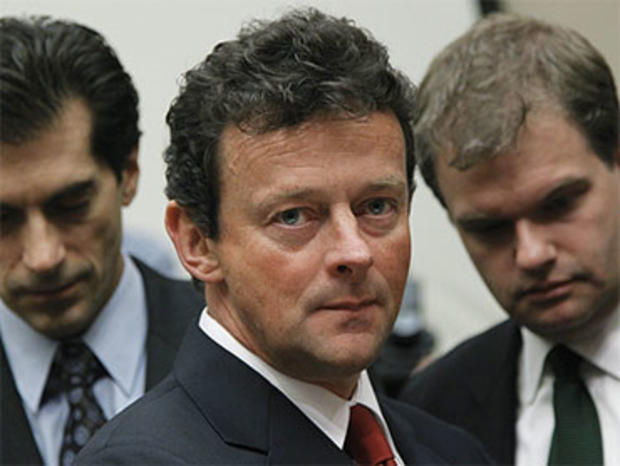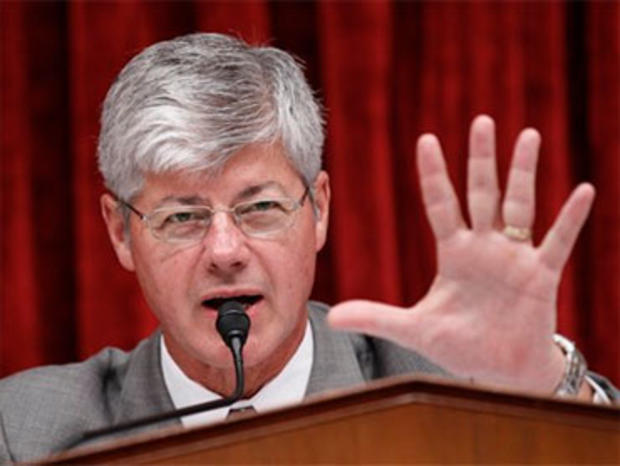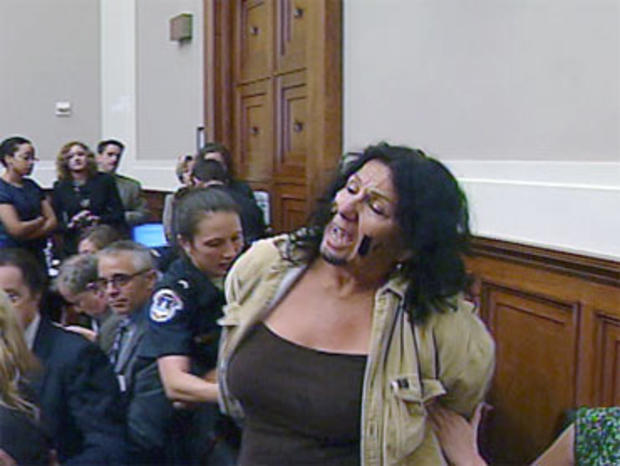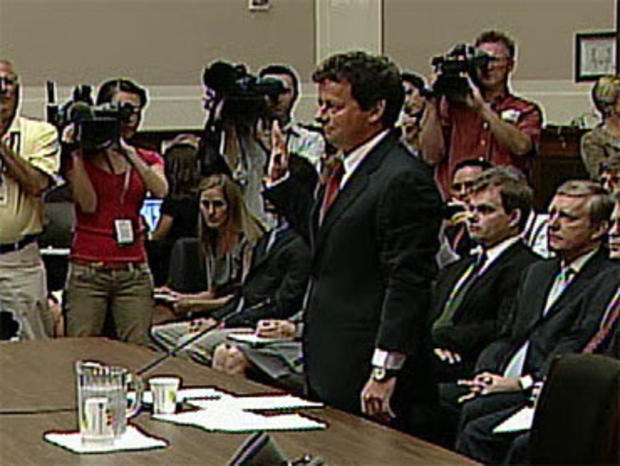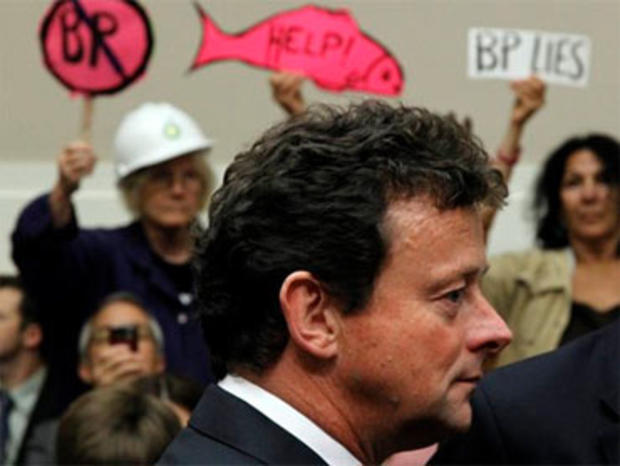Live Blog: BP CEO Faces Congressional Ire
Live coverage of the House Committee on Energy and Commerce hearing on "The Role of BP in the Deepwater Horizon Explosion and Oil Spill." The committee is probing what caused the April 20 rig explosion that killed 11 workers and caused the subsea oil gusher that is releasing an estimated 60,000 barrels per day into the Gulf of Mexico. BP CEO Tony Hayward testifies a day after the energy giant agreed to create a $20 billion fundfor damage claims.
5:37 p.m. ET: Stupak gaveled the hearing to an end but not before thanking Hayward for attending and then criticizing his answers as unhelpful to the committee.
"The evasiveness of your answers have increased the frustration, not decreased the frustration," Stupak said.
Colorado Democratic Rep. Diana DeGette, the committee's vice chair, referred to the evasiveness of Hayward's answers shortly before the hearing ended.
DeGette asked whether BP was committed to reimbursing long-term health care costs for cleanup workers.
"Twenty billion dollars is a very large fund to pay claims," Hayward said after saying that decision was up to the independent adjudicator.
"This is what is concerning members of this committee and others about BP's response here," DeGette said. "You evade questions."
4:53 p.m. ET: Markey gets another shot. He and several congressmen have recently called out Hayward for his constant references to the blowout preventer on the well as a "failsafe" and pointed out standing evidence of ways the preventer could fail.4:33 p.m. ET: Hayward has referred all day to the company's ongoing investigation into the explosion and said that BP will make the findings available as it reaches them and take "appropriate actions" in response. Waxman asks, "Why should we rely on you to do your own investigation?" Hayward says others are investigations as well and reiterates that he will share the results.
4:13 p.m. ET: Hayward says the deepwater drilling moratorium is "Probably the right thing to do until we have clarity."
3:47 p.m. ET: Louisiana Republican Steve Scalise is asking questions, and began by holding up a picture of an oiled pelican. A little gimmicky? Perhaps. But you could hear a thousand camera shutters - silent for the past few hours - clicking in the background, so the gimmick seems to have gotten the job done.
3:38 p.m. ET: Members of the full committee who are not on the investigations subcommittee are now asking questions. Rep. Cliff Stearns, R-Fla., got Hayward to say at least a dozen times that "There is no evidence of reckless behavior" by BP in advance of the explosion and spill.
3:22 p.m. ET: At the conclusion of his questioning time, Barton took a moment to apologize for his earlier comments. He didn't invoke them directly, but said that he feels BP is responsible for the disastrous leak and should be fully liable for paying for the clean-up and economic damage to American citizen. He said that if any of his comments today have been "misconstrued" to suggest otherwise, he apologizes.
3 p.m. ET: Ross now says that since his opening statement, 416,666 gallons of oil have leaked into the Gulf.
"It's rare that you hear Democrats and Republicans on this panel agreeing with one another," he says, but that is exactly what's happening today in both sides' criticism of BP.
Watch Hearing Online at CBSNews.com
Hayward's Written Testimony
Committee Letter to Hayward
Protester Disrupts Hayward Testimony
Rep. Joe Barton Apologizes Hayward
Special Section: Disaster in the Gulf
2:42 p.m. ET: Rep. Bruce Braley, D-Iowa, just tore into Barton's comments apologizing to BP and describing BP's meeting with the president yesterday at the White House as "a shakedown."
Braley tried repeatedly to get Hayward to deny that it was a shakedown, or the claims fund a "slush fund," but Hayward didn't really bite and relinquish the biggest gift he's been given all day. He just said, "We came together to figure out a way of working together to resolve what is clearly a very, very serious situation."
2:26 p.m. ET: Markey presents substantial scientific evidence - both from the government and academic experts - showing the presence of underwater plumes of oil far from the spill site and asked Hayward if he is now "once and for all prepared to concede" the existence of the plumes.
Hayward said that there is "oil in very low concentrations ... distributed throughout the column."
"There are concentrations of oil of about 0.5 parts per million," he said, but insisted that only some of that oil is attributable to the BP spill.
He added, "I'm not an oceanographic scientist."
2:15 p.m. ET: Stupak tells Hayward that during the recess, several members of the committee approached him "extremely frustrated by your lack of candor and your inability to answer their questions."
"You have not provided us with direct answers," he said, noting that the committee granted Hayward an extra week to prepare for the hearing at BP's behest. "I hope you will be more forthcoming and less evasive with your answers for the remainder of this hearing."
BP CEO Tony Hayward: Don't Blame Me
2:12 p.m. ET: The hearing is resuming. The congressmen have done all their voting for the day and there will be no more recesses (sorry kids!).
1:06 p.m. ET: The committee is back in recess for members to vote.
As Stupak was calling the recess, Burgess burst out to complain that the Minerals Management Service had not appeared at any of the hearings so far to answer for the regulatory failures that led up to the spill. He said, in effect, that MMS needed to answer questions because Hayward wasn't doing so.
An annoyed Stupak noted that there are are least two more hearings already scheduled and that other aspects of the investigation would be addressed in due course, but also said, "MMS is not going to help Mr Hayward answer the questions. Mr. Hayward has to do that himself."
Burgess seemed slightly chastened, pivoting back to a rant about Hayward's irresponsibility as Stupak hit the gavel and cut off the microphone.
12:58 p.m. ET: Dingell asks Hayward a staccato series of yes-or-no questions on BP's decisions related to the well construction - How much money was saved by that decision? How much time? Can you assure me that the decision was not made to save time and money? Hayward almost invariably answers that he doesn't know, can't answer, or wasn't party to the decision.
Dingell invariably replies, "Please submit that for the record." He concludes, "I'll look forward to seeing those answers in the record."
12:49 p.m. ET: Sullivan touts an oft-quoted statistic that never gets old. From 2005-2010, BP was cited for 760 serious safety violations. During the same time, Sunoco had eight., ConocoPhillips had eight, Citgo had two and ExxonMobil had one.
"We acknowledge the problems we had in 2005 and 2006," Hayward says.
12:44 p.m. ET: Stupak has been fairly firm on limiting members to three minutes of questioning, but Waxman was given significantly more time.
"I'm just amazed at this testimony," he says. "You're not taking responsibility, Mr. Hayward. ... You're kicking the can down the road."
12:41 p.m. ET: Waxman presses Hayward on whether he met the commitment he made upon become CEO to a "laser-like focus" on safety. Hayward says the company has made "significant progress" during his tenure.
12:33 p.m. ET: Republican Rep. Michael Burgess (Tex.) reiterates that unlike his colleague Mr. Barton he "will not apologize" to BP and is questioning Hayward fairly aggressively.
On the topic of whether there are other wells in the Gulf of Mexico that pose the same blowout risks, Hayward says, "There are many wells in the Gulf of Mexico that have the same casing design. There are many wells where the same cement procedure has been used."
12:18 p.m. ET: Hayward just reentered the chamber, flanked by two police officers. Stupak is reconvening the hearing.
11:50 a.m. ET: The protester who interrupted Hayward's opening statement appears to be the same woman arrested at a Senate hearing last week - Diane Wilson, a Texas shrimper and activist and co-founder of Codepink for Peace, CBS News' Brian Montopoli reports.
At that hearing, Wilson dumped what appeared to be oil on herself to protest Alaska Sen. Lisa Murkowski's blocking of a bill that would have lifted BP's liability cap.
11:33 a.m. ET: Stupak calls a recess to allow members to attend three votes before the question-and-answer period begins. The festivities continue at noon ET.
11:29 a.m. ET: Hayward begins saying that the explosion, fire, and resulting oil spill "never should have happened."
"When I learned that 11 men had lost their lives, I was personally devastated," he says and - directly addressing the people of the Gulf region - adds, ""I know that this incident has had a profound impact on your lives and has caused great turmoil."
11:26 a.m. ET: Hayward is sworn in. As he is about to begin his opening statement, a woman protester in the gallery bursts out screaming. She has to be brought to the floor by several Congressional police officers.
11:24 a.m. ET: Rep. Betty Sutton, D-Ohio, says, "It's unconscionable when companies pay more attention to their costs and their profits than to their own workers' safety. ... Like many Americans, I feel physically sick when I see the clips of the oil gushing in the Gulf."
She is at least the third member of Congress to quote a BP official's e-mail in which - referring to the decision not to use a safety device known as "centralizers" - he said, "who cares, it's done, end of story, will probably be fine."
11:08 a.m. ET: Rep. Mike Ross, D-Ark.: "Since this hearing began a little over an hour ago, Mr. Hayward, up to 112,947 gallons have been dumped into the Gulf."
11:05 a.m. ET: The members' opening statements continue, and will for a while before Hayward gets to utter word one. GOP Rep. Parker Griffith of Alabama commented that the committee would be remiss not to point out that smoking is the greatest disaster perpetrated by corporations in the U.S.
The oil spill "is not going to be the worst thing that ever happened to America," said Griffith, a cancer specialist.
10:46 a.m. ET: Rep. John Dingell, D-Mich., is chairman emeritus of the committee. He runs through a greatest hits reel of Hayward's less-than-eloquent (and many say outright deceptive) comments about the scope of the disaster.
"I just happen to be a poor Polish lawyer from Detroit," he says, but Hayward does not seem to be doing a good job as CEO, much less of managing or taking responsibility for the disaster. "It makes me wonder what the compensation package of our witness will be this year."
10:40 a.m. ET: Oklahoma Republican John Sullivan is the first committee member to directly address the cap-and-trade energy bill meant to address global warming, which passed the House last year but has languished in the Senate. He calls it "disastrous."
10:33 a.m. ET: Rep. Edward Markey, D-Mass., head of the Subcommittee on Energy and Environment, takes over.
"I want to begin by disagreeing in the strongest possible terms with what Mr. Barton said," Markey says. "It is BP's spill, but it is America's ocean and it is American citizens who are being harmed."
He says families in the Gulf will be "crushed" without the compensation fund.
Far from being a "slush fund," Markey says, "It is in fact President Obama ensuring that a company which has despoiled the waters of our nation is held accountable for the harm that it has done to our nation. ... This is, in my opinion, the American government working at its best."
10:25 a.m. ET: Stupak gives his opening statement, among other things calling Hayward out for a newspaper quote from shortly after he took over as CEO in which he said the company is "too cautious."
He said Hayward owes the committee answers: "You owe it to all Americans. We are not small people."
10:17 a.m. ET: Waxman ends his statement by pivoting to the broader question of energy policy, saying, "We need to start down a path to a clean energy future."
Rep. Joe Barton, R-Tex., the ranking member of the full committee, takes over and immediately takes BP's defense.
"We have kind of a dual track underway in my opinion. We obviously are trying to gather the facts," he says. But he adds - speaking only for himself and not the Republican Party, he says - "I'm ashamed of what happened in the White House yesterday. I think it is a tragedy of the first proportion that a private corporation can be subjected to what I would characterize as a shakedown - in this case a $20 billion shakedown."
Barton then, somewhat remarkably, apologized to BP.
"I apologize," he said. "I do not want to live in a country where any time a citizen or a corporation that does something wrong ... is subjected to what in my opinion, amounts to a shakedown."
10:10 a.m. ET: Full committee chairman Henry Waxman, D-Calif., is making his opening statement. He promises to take Hayward to task about a trove of internal documents that demonstrate BP's recklessness in advance of the explosion and oil spill.
"We can find no evidence that you paid any attention to the tremendous risks that BP was taking," he says. "There is not a single document or e-mail that shows you paid even the slightest attention to the dangers at this well."
10:05 a.m. ET: Rep. Bart Stupak, D-Mich., chair of the subcommittee on Oversight and Investigations, calls the hearing to order. He said that several of the congressmen present are members of the full Energy and Commerce committee but not the subcommittee, and lays down some ground rules for who will get to make statements and ask questions.
10 a.m. ET: Protesters are holding signs in the gallery with slogans like "BP Lies" and "BP Kills."
9:58 a.m. ET: Hayward is in the committee chamber, surrounded by a huge gaggle of photographers.
9:55 a.m. ET: On Tuesday, the committee grilled the chief executives from ExxonMobil, Chevron, ConocoPhillips and
Shell - as well as BPAmerica CEO Lamar McKay - about the companies' "cookie-cutter" disaster response plans, which included phone numbers for dead scientists and sections on mitigating harm to walruses, which haven't lived in the Gulf of Mexico for millions of years.
